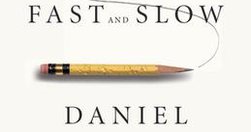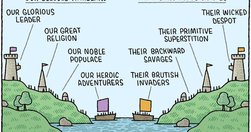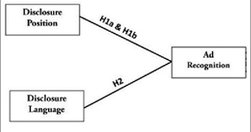Filter 1329 resources:
- media (464)
- news (369)
- disinformation (251)
- facebook (196)
- social media (170)
- journalism (152)
- curation (130)
- content strategy (95)
- comments (94)
- community (93)
- filter bubble (75)
- publicsphere (69)
- algorithm (60)
- native advertising (57)
- us2020 (56)
- ai (55)
- factchecking (54)
- eu (53)
- psychology (51)
- trump (46)
- longform (45)
- advertising (45)
- data journalism (39)
- storytelling (39)
- bloggingportal (36)
- twitter (34)
- politics (33)
- troll (33)
- trust (33)
- podcast (31)
- google (29)
- audiovisual (27)
- polarization (27)
- augmented reality (26)
- content (26)
- instant articles (26)
- medium (26)
- innovation (25)
- covid19 (25)
- mobile (25)
- propaganda (24)
- us (24)
- multilingualism (24)
- engagement (23)
- democracy (23)
- newsletter (22)
- ocm (22)
- bias (20)
- tool (20)
- video (20)
- bot (20)
- nytimes (20)
- conspiracy (19)
- metrics (19)
- identity (19)
- science (19)
- myhub (19)
- data (18)
- content marketing (18)
- censorship (17)
- productivity (17)
- bullshit (17)
- cognitive (17)
- brexit (17)
- newsroom (17)
- explainer (17)
- politicoeu (16)
- enewsletter (16)
- delegitimise (16)
- blogging (16)
- semantic (15)
- bbc (15)
- open web (15)
- data visualisation (15)
- regulation (15)
- platform (14)
- science journalism (14)
- online architecture (14)
- promotion (14)
- fediverse (14)
- amp (13)
- clickbait (13)
- cms (13)
- blog (13)
- communications (13)
- design (13)
- bloggingportal2 (13)
- groupthink (12)
- privacy (12)
- blockchain (11)
- machine learning (11)
- ea (11)
- web20 (11)
- cambridge analytica (10)
- virtual reality (10)
- post-truth (9)
- llm (9)
- backfire effect (9)
- visualisation (9)
- business model (9)
- qanon (9)
- domestic (9)
- hoax (9)
- russia (9)
- science communication (9)
- atomisation (9)
- media literacy (9)
- blogpocalypse (8)
- crowdsourcing (8)
- usa (8)
- bxlsbbl (8)
- brussels bubble (8)
- open source (8)
- marketing (7)
- interactive (7)
- populism (7)
- gtd (7)
- authenticity (7)
- copyright (7)
- circa (7)
- quartz (7)
- ai4communities (7)
- vote (7)
- chatgpt (7)
- web (7)
- buzzfeed (7)
- pay4content (6)
- knowledge management (6)
- bestof2015 (6)
- tribe (6)
- ux (6)
- app (6)
- linkedin (6)
- euractiv (6)
- web design (6)
- snapchat (6)
- sponsored content (6)
- seo (6)
- eurosceptics (6)
- apple (6)
- 2ndbrain (6)
- ec (6)
- fascism (6)
- headline (6)
- monetisation (6)
- suppress (6)
- information (6)
- europe (6)
- moderation (5)
- editorial (5)
- pr (5)
- dni (5)
- machine translation (5)
- substack (5)
- narratives (5)
- anti (5)
- guardian (5)
- audience research (5)
- moments (5)
- theme (5)
- society (5)
- persuasion (5)
- event (5)
- jeff jarvis (5)
- cory doctorow (5)
- gender (5)
- vox (5)
- nlp (5)
- climate (5)
- personal (5)
- framework (5)
- analytics (5)
- viral (4)
- collaboration (4)
- yanss (4)
- confirmation bias (4)
- top3pods (4)
- guide (4)
- creativity (4)
- futurism (4)
- free speech (4)
- notification (4)
- instagram (4)
- education (4)
- meme (4)
- blm (4)
- wikipedia (4)
- ethics (4)
- strategy (4)
- zettelkasten (4)
- culture (4)
- bundle (4)
- antivaxxer (4)
- influence (4)
- chat (4)
- publishing (4)
- solutions journalism (4)
- hate (4)
- tv (4)
- partisan (4)
- coral (4)
- lobby (4)
- future (4)
- inoculation (4)
- fbpaper (4)
- sublime (4)
- surveillance (4)
- corporate journalism (4)
- europa (4)
- sceptic (4)
- context (4)
- stream (4)
- realtime (4)
- uk (4)
- startup (4)
- motivated (3)
- slack (3)
- local (3)
- credibility (3)
- coda (3)
- homepage (3)
- outrage (3)
- infowar (3)
- policy (3)
- search (3)
- infopocalypse (3)
- aggrefilter (3)
- (3)
- faq (3)
- attentionweb (3)
- semanticweb (3)
- vine (3)
- personalisation (3)
- mobocracy (3)
- machine text (3)
- crowdfunding (3)
- atprotocol (3)
- signal2noise (3)
- misinform (3)
- debunk (3)
- visual (3)
- eurosceptic (3)
- deep fake (3)
- english (3)
- participation (3)
- radio (3)
- bluesky (3)
- gamification (3)
- echo chamber (3)
- livestream (3)
- gpt-x (3)
- cards (3)
- paywall (3)
- share (3)
- adblock (3)
- wapo (3)
- rebelmouse (3)
- youtube (3)
- paper (3)
- euroblog (3)
- explanatory (3)
- blogactiv (3)
- management (3)
- digital transformation (3)
- gdpr (2)
- humour (2)
- infographic (2)
- addiction (2)
- brand (2)
- truth (2)
- psychometrics (2)
- china (2)
- agile (2)
- inscrutable (2)
- computational propaganda (2)
- memory (2)
- sentiment analysis (2)
- interface (2)
- digital (2)
- mvp (2)
- opinion (2)
- optimisation (2)
- writing (2)
- egovernment (2)
- hr (2)
- reflectivity (2)
- dunning-kruger (2)
- circa2 (2)
- team (2)
- html5 (2)
- 360video (2)
- mastodon (2)
- automation (2)
- facebook live (2)
- storyful (2)
- philosophy (2)
- history (2)
- multimedia (2)
- disruption (2)
- hoaxy (2)
- library (2)
- trending (2)
- conversation (2)
- loyalty (2)
- magazine (2)
- impact (2)
- buzzbot (2)
- ft (2)
- counter speech (2)
- messaging (2)
- signaltonoise (2)
- syndication (2)
- spain (2)
- vice (2)
- training (2)
- nuzzle (2)
- river4 (2)
- rss (2)
- ios (2)
- wiki (2)
- image (2)
- outreach (2)
- digg (2)
- economics (2)
- open science (2)
- b2b4me (2)
- api (2)
- election (2)
- ep (2)
- technology (2)
- audio (2)
- responsive (2)
- photography (2)
- scraping (2)
- fivethirtyeight (2)
- mediafr (2)
- portal (2)
- expert (2)
- livefyre (2)
- taxonomy (2)
- postmodern (2)
- skills (2)
- civil rights (2)
- faceted search (2)
- gawker (2)
- basic (2)
- cookies (2)
- web2.0 (2)
- mybot (2)
- curatorbot (2)
- ltinnovate2016 (2)
- bookmark (2)
- collective intelligence (2)
- posse (2)
- decentralised (2)
- balance (2)
- roamresearch (2)
- research (2)
- lobbying (2)
- pink slime (2)
- activitypub (2)
- flicc (2)
- memex (2)
- arg (2)
- blogtour (2)
- tools (2)
- themes (2)
- euractiv-com (2)
- syndicated-translation (2)
- ai prompt (2)
- botshit (2)
- enshittification (2)
- sari azout (2)
- ai search (2)
- robert putnam (2)
- idpi (2)
- einstein (1)
- terrorism (1)
- agriculture (1)
- infosociety (1)
- independence (1)
- obama (1)
- negativity bias (1)
- meaning (1)
- europcom (1)
- empathy (1)
- list (1)
- listapp (1)
- commonplace (1)
- keyword (1)
- european (1)
- eparticipation (1)
- monitoring (1)
- slow news (1)
- network theory (1)
- guidelines (1)
- documentum (1)
- serendipity (1)
- fuego (1)
- conversational (1)
- sill (1)
- justice-home-affairs (1)
- comment (1)
- nft (1)
- notion (1)
- slidecast (1)
- elon musk (1)
- knowledge graph (1)
- gmo (1)
- law (1)
- network (1)
- pkm (1)
- procrastination (1)
- bioethics (1)
- 3p framework (1)
- conference (1)
- genetic (1)
- remote (1)
- oatmeal (1)
- language (1)
- consultation (1)
- speech to text (1)
- australia (1)
- lofi (1)
- transcript (1)
- animation (1)
- mindfulness (1)
- blendle (1)
- iot (1)
- agora (1)
- schema.org (1)
- apathy (1)
- slacktivism (1)
- roi (1)
- flancian (1)
- scaling synthesis (1)
- adaptive content (1)
- fear (1)
- hive (1)
- trove (1)
- hbr (1)
- trends (1)
- ello (1)
- twitter migration (1)
- wisdom (1)
- wikileaks (1)
- shieldlaw (1)
- shortform (1)
- cmv (1)
- nsa (1)
- scrollytelling (1)
- google+ (1)
- paid (1)
- comics (1)
- yahoo (1)
- campaign (1)
- abtesting (1)
- autosummarise (1)
- evolution (1)
- perplexity.ai (1)
- programmatic (1)
- happeningo (1)
- calendar (1)
- paradigm (1)
- anonymity (1)
- nat eliason (1)
- archive (1)
- digital garden (1)
- ukraine (1)
- eeas (1)
- screencast (1)
- upshot (1)
- tabloid (1)
- binggpt (1)
- chinese (1)
- halo (1)
- python (1)
- illusory (1)
- startupy (1)
- framing (1)
- right (1)
- expiration (1)
- governance (1)
- values (1)
- ombudsman (1)
- citizenship (1)
- publicsector (1)
- stochastic parrot (1)
- snowden (1)
- christopher manning (1)
- native (1)
- emily m bender (1)
- free (1)
- newsana (1)
- newscred (1)
- muckread (1)
- pinterest (1)
- eurocrap (1)
- reddit (1)
- belgium (1)
- bingchat (1)
- social (1)
- information architecture (1)
- letters2eu (1)
- lean canvas (1)
- perception (1)
- vandenbrande (1)
- cultural exchange (1)
- tourism (1)
- employee engagement (1)
- safety (1)
- quit (1)
- messenger (1)
- broadcast (1)
- co-creation (1)
- language technology (1)
- help (1)
- web development (1)
- debatehub (1)
- ep2014 (1)
- stanbol (1)
- apache (1)
- meps (1)
- prezi (1)
- omission (1)
- scale (1)
- pilot (1)
- roaming (1)
- eesc (1)
- douglas rushkoff (1)
- google glass (1)
- colfdusion (1)
- honesty (1)
- conform (1)
- green (1)
- blogosphere (1)
- disgustology (1)
- data void (1)
- hololens (1)
- experiment (1)
- npr (1)
- tracking (1)
- firefox (1)
- transparency (1)
- notd (1)
- annotate (1)
- presentation (1)
- alan blackwell (1)
- indieweb (1)
- bertelsmann (1)
- desirability (1)
- digital civility (1)
- interoperability (1)
- bookmarklet (1)
- post-alpha (1)
- alpha phase (1)
- saas (1)
- presseurop (1)
- neural link (1)
- data4policy (1)
- geofence (1)
- pro (1)
- eaststratcom (1)
- sociology (1)
- blackpr (1)
- power (1)
- criti-hype (1)
- yeats (1)
- newsguard (1)
- pluralistic ignorance (1)
- threadapalooza (1)
- gatsby (1)
- geopolitics (1)
- talia stroud (1)
- insurge (1)
- knowledge illusion (1)
- data portability (1)
- philippines (1)
- curiosity (1)
- euvsdisinfo (1)
- spambot (1)
- syllabus (1)
- wikinews (1)
- software (1)
- joan westenberg (1)
- ipr (1)
- eli pariser (1)
- ussr (1)
- intro (1)
- imposter syndrome (1)
- expertise (1)
- quiz (1)
- cancel culture (1)
- dissonance (1)
- define (1)
- critical theory (1)
- woke (1)
- wikitribune (1)
- risk (1)
- circuit-breaker (1)
- overfitting (1)
- cui bono (1)
- peace data (1)
- information laundering (1)
- knowledge panel (1)
- fakebox (1)
- report (1)
- metaphor (1)
- brave (1)
- plandemic (1)
- project management (1)
- polbot (1)
- ginsburg (1)
- truthbuzz (1)
- section230 (1)
- po.et (1)
- participatory culture (1)
- splinternet (1)
- fleeting (1)
- adversarial interoperability (1)
- planetary (1)
- scuttlebutt (1)
- trust net (1)
- early adopter (1)
- sensemaking (1)
- tiktok (1)
- new public (1)
- stack overflow (1)
- deplatform (1)
- discord (1)
- pluriverse (1)
- anonymous (1)
- floc (1)
- plato (1)
- metaverse (1)
- label (1)
- cookiepocalypse (1)
- flipboard (1)
- fedwiki (1)
- presidency (1)
- cozyweb (1)
- obsidian (1)
- willpower (1)
- compass news (1)
- vsop (1)
- garden (1)
- social-media (1)
- publicsectorinformation (1)
- cluetrain (1)
- pubhub (1)
- programmes (1)
- insurrection (1)
- rebuttal (1)
- business (1)
- ngo (1)
- organisation (1)
- lisp (1)
- yellow-card (1)
- social marketing (1)
- freedom (1)
- user (1)
- newsfeed (1)
- citizen journalism (1)
- city (1)
- playbook (1)
- parse.ly (1)
- fomo (1)
- authoritarianism (1)
- experience (1)
- liquid democracy (1)
- ethereum (1)
- freelancer (1)
- vr (1)
- filter (1)
- referrals (1)
- feed (1)
- mixed reality (1)
- discourse (1)
- slideshow (1)
- periscope (1)
- youth (1)
- public affairs (1)
- atlantic (1)
- altright (1)
- creativecommons (1)
- radicalisation (1)
- health (1)
- liberalism (1)
- google analytics (1)
- bubble (1)
- scandinavia (1)
- life-in-belgium (1)
- apple news (1)
- upday (1)
- samsung (1)
- social capital (1)
- emergingus (1)
- hungarian (1)
- webgl (1)
- 3d (1)
- line (1)
- accreditation (1)
- sponsor (1)
- the conversation (1)
- mooc (1)
- useful (1)
- centralised (1)
- membership (1)
- euro (1)
- italy (1)
- diig (1)
- slideshare (1)
- epsc (1)
- snowfall (1)
- text (1)
- transmedia (1)
- cx (1)
- “illusory (1)
- truth psychology (1)
- isis (1)
- holacracy (1)
- partnership (1)
- atavist (1)
- longreads (1)
- mediumform (1)
- coach (1)
- theoretical physics (1)
Relevant Overviews
- Communication Strategy
- Content Strategy
- Online Strategy
- Online Community Management
- Social Media Strategy
- Content Creation & Marketing
- Online Architecture
- Digital Transformation
- Innovation Strategy
- Communications Tactics
- Psychology
- Social Web
- Media
- Politics
- Communications Strategy
- Science&Technology
- Business
Overview: Media
Relevant resources

Another 13 U.K. publishers are signed up to start using Facebook’s Instant Articles, including The Daily Telegraph, The Mirror, The Daily Mail and The Economist, Sky News, sports site 90min.com and The Sun.The BBC and the Guardian were the first U.K. partners, and there are plenty more waiting in the wings.
Neat idea, if not exactly being exploited by many

Ultimately, what publishers and advertisers care about most, however, is how much quality time a person spends with a story. To judge that, publishers are developing newer metrics like “time spent” reading, “scroll depth,” “engagement,” “recirculation,” “shares,” and “percentage of article completed.”

With independent journalism increasingly looking like an endangered species, a EU communication strategy that helped European media build the European Public Sphere would be a smarter longterm move than propaganda and brochureware

The might of Google and Facebook in the digital market, combined with structural changes such as the growth of mobile, which is proving harder to monetise than print, has increased the pace of change since last summer... Guardian Labs, its branded content division launched in 2014, to “make a far, far greater contribution” over the next three yea…

As a reporte... there may be a simple solution to the bad commenter problem: You. When reporters get involved, it results in fewer uncivil comments, according to research... “it’s like a teacher walks into a classroom and suddenly all the kids are quiet and fold their hands at their desks.” Here are a few tips and best practices for reporters in …
uncivil comments dropped by 15 percent when reporters were participating in the conversation
a closer look at what types of comment sections news organizations ... value they are adding to news organizations’ overarching strategies...a list of questions to ask and best practices for news organizations seeking return on investment...key questions, considerations and links to further reading for evaluating what commenting strategy works bes…

The European Political Strategy Centre gathered a select group of leading international academics to provide input to the ongoing public consultation on a regulatory environment for online platforms.
benefit of building a brand that audiences recognize ... allow us to build a strong revenue model and a strong connection to an audience. If they see us on Snapchat and Snapchat has a very large audience, then they get to know and trust Vox and see it as a source that they care about... think about your brand as an interconnected ethos that should…
first U.S. newspaper and first business publication available on the platform ... (U.K.’s Daily Mail is also there).... team consists of five people who will publish eight items each weekday ... “a mix of core coverage, such as Markets, Business, and World news, and the luxury and lifestyle features that we believe provide the perfect snackable c…

Howdy, a bot company devoted to automating common workplace tasks. Its product lives in Slack ... operates in the background, listening for the keywords and questions that will activate its powers. ... automates meetings, asking what people are working on, collating their answers, and distributing them to the team ... take your lunch order ... AI…

Mobile requires a different set of UI/UX and needs different forms of content and advertising, too. That's easy to write, but very hard to implement, especially if you have a newsroom full of experienced people who have learned their trade with a different paradigm in mind. Media startups like vox.com, Buzzfeed, Huffington Post and others... adapt…

“How data is generating green lights to keep you moving on the road” is a piece of native advertising paid for by Siemens and written by Quartz’s marketing team. It’s also a perfect example of how Quartz is bringing compelling storytelling and design to sponsored content... Quartz uses an in-house creative team to extract relevant stories and ta…

Thinking, Fast and Slow is a best-selling[1] 2011 book by Nobel Memorial Prize in Economics winner Daniel Kahnema...: his early days working on cognitive biases, his work on prospect theory, and his later work on happiness.The book's central thesis is a dichotomy between two modes of thought: "System 1" is fast, instinctive and emotional; "System …
Therein lies the trouble with virtual reality. The hardware is incredible, but the content has been slow to catch up. Shooting 360 degree video and audio in a way that isn’t jarring and tells a coherent story is difficult and expensive... any brand that deals with physical products and experiences should start thinking about what the ultimate VR …

The media’s reaction to David Bowie‘s death from cancer early this morning demonstrates just how widely curation has become in journalism practice – and specifically, how it has become the web native version of the obituary. Below I’ve done a bit of curation of my own: 8 13 ways that different publications used curation to mark the death of a lege…

the idea that everyone is like us is called the “false-consensus bias.”... Online it means we can be blindsided by the opinions of our friends or, more broadly, America... morphs into a subconscious belief that we and our friends are the sane ones and that there’s a crazy “Other Side” ... that just doesn’t “get it,” ... not as intelligent as “us.”…

bringing new technology into the newsroom to change how the outlet commissions and publishes opinion pieces ... expand the coverage beyond just text, into visual story formats that can be accessed and shared across different platforms.... the FT's comment section is a "huge source of strength and a very valuable asset".... a new Facebook commu…

from a locked-down Brussels to a grieving Paris to a refugee camp in Greece, Henry Porter reports on the European Union’s existential crisis.

“print dollars have turned into digital dimes, which are turning into mobile pennies.” Basically, even as we consume more news than ever, thanks to mobile’s proliferation, the revenue streams are actually diminishing... Where’s the money going to then, you ask? To Facebook, Google, and Twitter, the winners on mobile...As publishers turn more and …
For the US daily newspaper sector over the past decade, weekday circulation has fallen 17 percent and ad revenue more than 50 percent ... a key for the industry is changing the culture of newsrooms to foster innovation. This includes allowing interaction of different groups—journalists, technicians and others which the study referred to as "tribes…
Peak Content, the point at which this glut of things to read, watch and listen to becomes completely unsustainable. There hasn’t been enough ad revenue to sustain it for years ... 2016 will mark the beginning of a shake out...winning ad dollars is becoming more of a zero-sum game, and the winners appear to be the mobile-first digital advertisers l…

Facebook already accounts for a huge proportion of the web traffic to major media sites. And publishers are rushing even further into its embrace because they have no choice and can’t think of a better option... ad blocking is taking care of what’s left of the media’s ambitions to continue as standalone entities... there are rays of hope in the …

Consumers have difficulty distinguishing between native advertising and editorial content, according to a new study by researchers at Grady College ... only 17 out of 242 subjects -- under 8% -- were able to identify native advertising as a paid marketing message in this experiment... Just 18.3% identified native ads as paid messages in the secon…

Media heads towards 'winner take all' landscape: “You don’t want to be a second- or third-tier partner."

The extremist adherents of this new political correctness have essentially taken a flamethrower to the public space and annihilated its center. Topics in American life that once were the legitimate subjects of debate between liberals and conservative are now off-limits and lead to immediate attack by the cultural establishment if raised at all. An…

Publishers like the New York Times should be having an existential crisis over Facebook’s instant articles. Instead they’re embracing them.. digital content is being divided between a lucrative high-end entertainment world,... and a low-end publishing world where content is expected to be “free,” ... a model that... might work to BuzzFeed’s adv…

IS IT boom or doom in the news business? Headline-grabbing sums are being invested in online newspapers... Yet for those publications founded in the era of hot-metal type, advertising revenues continue to fall... American dailies lost around $30 billion in ad spending between 2005 and 2014, or 60% of the total... the main hope is to find ways of b…

we want to create use cases for people with limited time available to explore news stories on the mobile ... challenge is to provide the news in a quick, snappy format while also providing the opportunity to deepen their understanding when needed. As well as providing summaries and deeper information we feel this approach could lead to news bec…
Loading more...
Relevant Overviews
- Communication Strategy
- Content Strategy
- Online Strategy
- Online Community Management
- Social Media Strategy
- Content Creation & Marketing
- Online Architecture
- Digital Transformation
- Innovation Strategy
- Communications Tactics
- Psychology
- Social Web
- Media
- Politics
- Communications Strategy
- Science&Technology
- Business